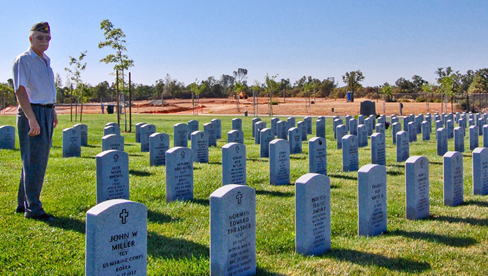
Korean War veteran finds the going tough to see chapel built at veterans cemetery.
A Korean War veteran and retired California state lawmaker, K. Maurice Johannessen lives by the proverb, “The man who says it cannot be done should get out of the way of the man who is already doing it.” In the California Senate, his unbridled championship of veterans earned him the nickname “Mojo.”
Today, he still fights on behalf of his fellow veterans. His latest project: construction of a chapel in the Northern California Veterans Cemetery. Such an effort, however, is not proceeding without some controversy. The Mojave Desert cross, the Boy Scouts’ dismissal from Balboa Park in San Diego and the cross at Mount Soledad’s veterans memorial have led to legal challenges that, although unresolved, have had a chilling effect on such efforts as a new chapel in a state veterans cemetery.
Johannessen, a member of The American Legion, is determined to fight for the chapel and get it built if he has to do it himself. He recently spoke with Alana Burke, a radio-talk-show host who has been following his story, for The American Legion Magazine.Q: Even in retirement, you continue to work for veterans. What’s your motivation?
A: I was born in Oslo, Norway, in 1934, and grew up during the Nazi occupation. The Americans and Allies made a big impression on me. After the war, I started to read about the United States – about the big trees in California, the ruggedness and individualism. At 17, I joined the Merchant Marines, and I worked my way, steerage if you will, over to the United States. I landed in San Pedro not speaking any English, with 20 bucks in my pocket.
I joined the Army during the Korean War, and I read everything I could find on American history, the Constitution, and learned the language. One of my most prized possessions is my immigration paper with a photo showing me in my American uniform.
The military was my benefactor, and it was because of my time in the service that I got my citizenship, education, and all the things this country has to offer. The veterans served this nation when we needed them, and this must not be forgotten.Q: You authored, or co-authored, 74 bills for veterans, but the Northern California Veterans Cemetery was especially important to you. Why?
A: As a senator, I made a conscious decision that the best way I could pay back what I had was by protecting the veterans and making sure that all that was promised to them would come to pass.
I knew there had to be a veterans cemetery in northern California because veterans have the right to anticipate where they will be buried and that their family can come and visit them. The state and federal government had issues with the funding, and I was told that not very many people would come to the cemetery, not very many veterans. I fought it through, and we are at over 2,500 right now at rest in the cemetery. Q: Now you’ve taken on yet another project, a chapel in the cemetery?
A: Yes, but the problem is that the government doesn’t want anything to do with building chapels, because of the religious connotation.Q: Much like the Mojave Cross, which even now the ACLU wants torn down?
A: We don’t exclude anyone, but this is our heritage. Unfortunately, there are people who don’t understand history or what made America so exceptional in the world, and why people like me wanted to come here. When I came here, I made a commitment to be an American. It means something to be an American.Q: And the chapel?
A: The cemetery needs a chapel so the family can be in remembrance and have their funeral inside, out of the rain and heat. I could not get any funds from the government, but the state finally agreed to lease me a piece of ground so that I can build the chapel myself, and then when it is finished, hand them the key, which I will do.
I can’t call it a chapel. It is a veterans memorial building. But this will be a chapel, and it will be nonsectarian because my friends in the military come in all makes, shapes and colors. A congressman told me, “Now, Senator, when you look at the drawings of the building, it looks like a cross from the air.”
And I said, “You kidding me? I never thought about that!”Q: What about the terms you have agreed to with the state? Not very many people would agree to fund it, build it and then hand it over.
A: It was the only way to get the chapel for the veterans. I give the military all the accolades for teaching me to be an American. It is a demand on my soul to do this. I am paying back a debt of gratitude, and I intend never to quit. There will be support for the veterans.Alana Burke is a columnist and radio-talk-show host in northern California. She can be contacted via e-mail at alana@alanaburke.com. The Web site for her program is www.alanaburke.com.
For more information about the chapel, visit the California Veterans Assistance Group's Web site.
- Magazine

